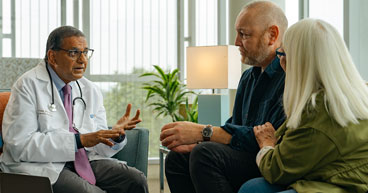
It’s not a stretch to say that every patient diagnosed with cancer —along with caregivers and loved ones—may face a language barrier when talking to doctors about his or her condition. Cancer has a language all its own. It’s not likely words or phrases like immune checkpoint inhibitors or brachytherapy are part of most people’s everyday vocabulary.
For patients in American hospitals who are limited English proficient (LEP), the language barrier may be twice as challenging. Non-English-speaking patients may not only have difficulty grasping the language of oncology, but they also may understand little or nothing their doctor is telling them.
“I often tell patients who are newly diagnosed that language lessons are an important aspect of them understanding their disease and making informed decisions,” says Stephen Lynch, MD, Vice Chief of Staff and Primary Care and Intake Physician at City of Hope® Cancer Center Phoenix. “The terminology associated with cancer diagnoses is typically very foreign to patients and their families. The medical terms themselves are a different language. This process is even more challenging when the information is filtered through an interpreter due to language barriers.”
It is critical that patients who are LEP use a certified medical interpreter to help them understand their options. These bilingual or multilingual professionals work with doctors and patients to break down the language barriers that separate them.
In this article, we’ll explore:
- What is a medical interpreter?
- Why are medical interpreter services important?
- Are providers required to offer medical interpreters?
- Finding interpretation services in health care
If you have been diagnosed with cancer and are interested in getting a second opinion about your diagnosis or treatment options, call us or chat online with a member of our team.
What is a medical interpreter?
More than 2 million Americans will be diagnosed with cancer this year. Among them will be many of the 10 percent of American citizens and non-citizens who don’t speak fluent English.
Enter the certified medical interpreter. These professionals are highly trained, not just in the ability to interpret the spoken word from one language to the other and vice versa. They also go through extensive training to understand the language of medicine—including oncology.
“It's very intense training for about six months and then for the certification, there's another year of training,” says Carlos Valle, one of three staff Certfified Medical Interpreters at City of Hope Phoenix. “Then the training continues as you decide which hospital you may be working in. If you are going to be interpreting in an oncology hospital there are courses that you can take that are focused on cancer.
“Thre's also general training because we may see different specialties. Even though this is a cancer hospital we have gastroenterology, we have pulmonary, we have cardiology. So, we have to have knowledge in all of those areas as well. And then we’re constantly learning and picking up terminology over our years of experience.”
Valle is not just a medical interpreter. He also translates written materials and documents, such as patient records brought from other countries, from Spanish to English. And he also is a patient advocate, helping patients manage appointments and find answers to questions about their diagnosis and treatment options.
“Certified medical interpreters are not a luxury in our facility but rather a necessity,” Dr. Lynch says. “It is only through their experience and skill that the process works well. They are an integral part of our team and are heavily relied upon to ensure we are providing our patients with the information they need.”
Why are medical interpreter services important?
The National Cancer Institute Dictionary of Cancer Terms contains 9,331 entries—from A33 (a monoclonal antibody) to Zytiga (a drug used to treat prostate cancer).
While certified medical interpreters may not have committed all of these terms to memory, they likely know more about the language of cancer than most patients or caregivers.
Interpreters use that knowledge as they review a patient’s diagnosis, medical, cancer and family histories, medications and previous treatments. They may also discuss a patient’s situation with a doctor before the session begins.
“Dr. Lynch, for instance, will brief us before we see the patient,” Valle says. “He will let us know what information he has about the patient and give us a quick rundown, so we know what we're going be interpreting about.
“We’re there from the very first appointment. If the patient is going to require an interpreter, we are notified by the schedulers and we schedule ourselves accordingly to the patient.”
When a session begins, interpreters are required to provide word-for-word interpretations, as best they can, from the doctor and the patient.
“At the same time, we're also reading body language and we can pick up when the patient is not understanding and we can ask, ‘do you understand what we just explained?’” Valle says. “If they say no, then the clinician may give us the liberty of elaborating so the patient can better understand.”
Are providers required to offer medical interpreters?
Through the 1964 Civil Rights Act, the 2010 Affordable Care Act and other measures, the federal government prohibits heath care providers from discriminating against any patient due to age, sex, race, disability or national origin.
These laws require health care providers to offer interpretation services to patients who do not speak English.
According to a report by The Joint Commission, an organization that accredits hospitals and health care organization, patients often have better outcomes when medical interpreters are able to break through language barriers. In fact, the report says, when interpreters are not used, patients may have a higher risk of:
- Longer hospital stays
- Surgical infections
- Falls
- Surgical delays
- Readmissions for chronic conditions
- Difficulty managing their medications
The Joint Commission report says: “Because communication is a cornerstone of patient safety and quality care, every patient has the right to receive information in a manner he or she understands. Effective communication allows patients to participate more fully in their care. When a patient understands what is being said about his or her care, treatment, and services, that patient is more likely to fulfill critical health care responsibilities.”
Finding interpretation services in health care
Some patients may prefer to have a bilingual caregiver or family member interpret their doctors for them. In those cases, patients are required to sign a release, specifying they rejected interpreter services, Valle says.
But that doesn’t mean the interpreter leaves the room. Often, a family member will realize the complexity of the dialogue and reach out to the certified interpreter for help.
“We explain to the caregivers this is a free service and that it's to their benefit to use somebody who is medically trained.” Valle says. “And we also explain that our services can take away some of the stress, because they are there to support the family as well. Sometimes they can be emotionally involved with the patient, as they're discussing their diagnosis and treatment options. So, why have that extra burden of having to interpret when they're there supporting family members.”
Often, it’s the interpreter who shares the burden of bad news with the patients and caregivers. Interpreting news of a difficult diagnosis or poor prognosis requires interpreters to mediate emotional discussions between patients and doctors.
“There have been situations where I had to interpret that we had no more options,” Valle says. “I've worked in pediatric settings where the physicians would be crying, giving bad news to parents. The parents would be crying. Interpreters would be crying. It's a very difficult situation.
“After those sessions, we have to take a break and try to regroup ourselves so we can be mentally available for the next patient.”
If you have been diagnosed with cancer and are interested in getting a second opinion about your diagnosis or treatment options, call us or chat online with a member of our team.


